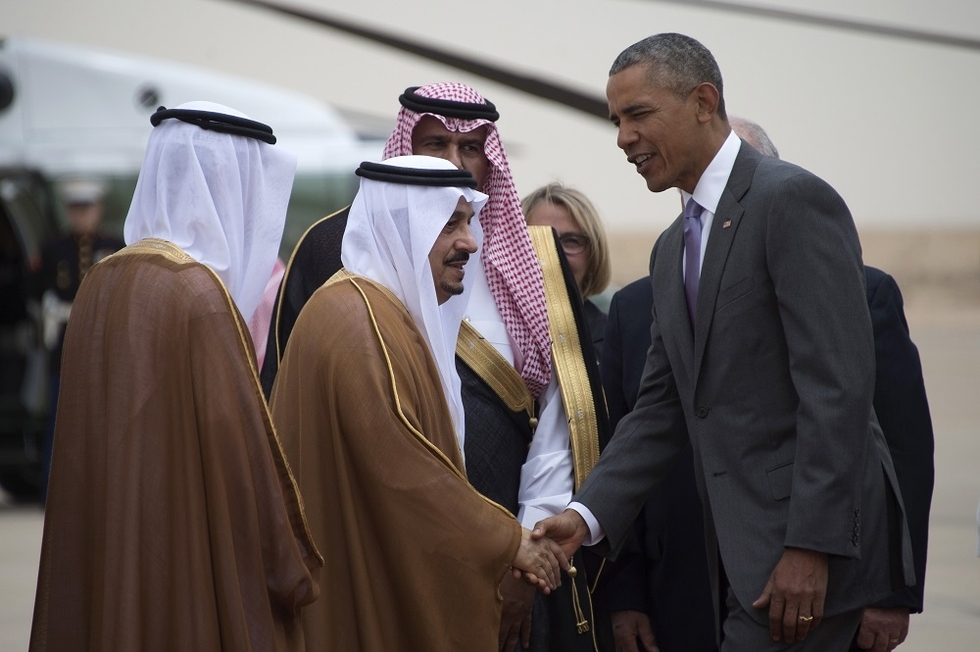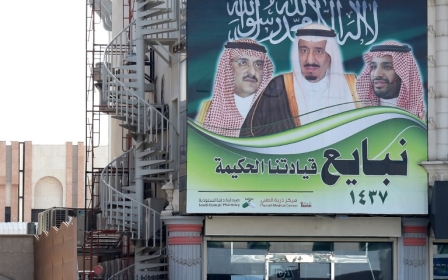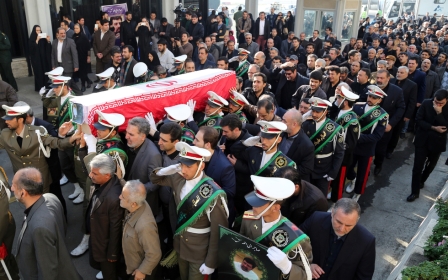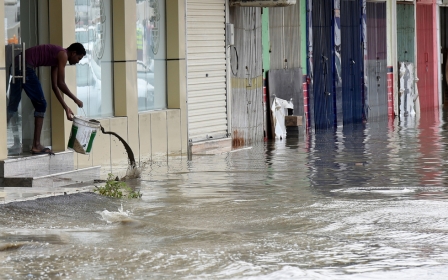ANALYSIS: The spectre of 9/11 looms large during Obama's visit to Riyadh

US president Barack Obama landed in Saudi Arabia on Wednesday hoping to ease tensions with Riyadh amid rows over a laundry list of issues including a controversial US terrorism bill, differences over wars in Syria and Yemen and relations with Iran.
Speculation over the fraught US-Saudi relations hit a fever pitch when King Salman sent Riyadh's governor to meet the US president, choosing instead to greet GCC leaders at another airport.
Sharif Nashashibi, a UK-based journalist and political analyst said that move would be seen as a “snub, particularly given that the king didn’t attend last year’s Camp David summit”.
Christopher Davidson, a reader in Middle East Politics at the University of Durham, also said the greeting - or lack thereof - should be seen as a “trivial snub,” but stressed this would have been done purely to appease certain sections in the Saudi leadership angered by Obama’s foreign policy.
Obama went on to meet Salman soon after his arrival, with the two exchanging niceties about the visit, according to reports.
Despite the suggestions of tensions, Davidson stressed that the meeting would have been “very cordial … with Salman having a long standing relationship with the US”.
Christian Koch, the director of the Gulf Research Center Foundation in Geneva, also said the meetings themselves would not be tense and the reports of a rift were grossly exaggerated.
“Saudi will clearly put down its position and they will see how they can come to an agreement that furthers relations,” he told Middle East Eye. “So while there will be differences of opinion, there will not be tensions, and these will be dealt with cordially.”
The media response to Obama's two-day trip has also been highly muted and unlike his last visit a year ago, the Saudi state news channel al-Ekhbaria did not broadcast Obama's arrival.
Several journalists also complained on social media that a number of TV crews, including CNN, were being prevented from filming the visit.
However, analysts stressed that security was most likely the reason for minimising press opportunities with the Islamic State group carrying out attacks in Saudi Arabia and pledging all-out war on the country.
There have also been suggestions that the relatively dampened Saudi media response to the two-day summit could be down to the fact that Obama will be stepping down next January, with al-Hayat newspaper saying that it was merely "a farewell summit" and adding that "Obama will no longer be either useful or relevant to the Gulf states.”
But such an interpretation may well be premature.
“The outcome of the race will matter a great deal to them,” Nashashibi said. “There is no indication that any of the possible presidential winners will be any more favourable toward Saudi Arabia in particular. So as much as they are unhappy with Obama, he might be much better than his successors.”
9/11 bill
At the heart of tensions is a highly contested bill that could see families of 9/11 survivors sue Saudi Arabia.
The bill, now moving through the Senate, is based on the findings of a redacted 28-page section of the Congressional 9/11 report that many believe links low-ranking Saudi diplomats to the 2001 terrorist attacks on the US.
Presidential hopefuls Bernie Sanders and Hillary Clinton have both said they favour release of the report. Republican frontrunner Donald Trump has gone even further, saying he would reassess the relationship with Riyadh.
Obama originally fought against the bill, even possibly threatening to veto it. But the day before he arrived in Riyadh, he told Charlie Rose that his government may yet release the report that has been gathering support on both sides of the US Congress and, on Tuesday, even won the tentative backing of influential Republican Senator Lindsey Graham.
If the bill passes, Saudi Arabia has threatened to sell $750bn of US holdings, mainly treasury securities and investments, in a move that threatens to fundamentally rock relations between Riyadh and Washington.
Koch believes that the threat “was not serious” and should not be “over-evaluated” especially given how difficult it would be to liquidate this kind of sum in a short period of time.
“It’s more a signal to Congress and the people to not always focus on the negative aspect and criticise Saudi and to also show the positive side,” he said.
But others are less certain.
Nashashibi argued that Riyadh would have no choice and would have to start selling in order to not “undermine the perception of Saudi resolve”.
Davidson said that Saudi’s weakening economic position meant that they had already begun divesting from the US.
“They have already begun to [sell US assets]. Most analysts indicate that the gaps it has been plugging in its budget can only be explained by accessing the most liquid overseas assets that they have got which is US treasury bonds,” he said.
“We have seen Saud bin Faisal bin Abdulaziz Al Saud and also foreign minister [Adel al-Jubeir] allude to these treasury bonds almost as leverage that they hold.”
Saudi Arabia has previously called on the papers to be released, sparking suggestions that they have nothing to hide, although Davidson argues this was nothing more than a “bluff” made at a time when Riyadh knew it held sufficient sway in Washington to get the measure thrown out.
Ultimately though, Davidson says that while fears are high that the report will be used to isolate Riyadh internationally, Salman still has tricks up his sleeve that should keep Washington on side for the foreseeable future.
“[The king and his son] realise that the only way they can keep power in the future is by selling off Saudi assets with Western assistance… I still don’t think that the papers will be released because Salman has managed to shift Saudi to being a potential candy store of state asset sell offs. They believe that these can still entice the US and keep relationship alive by shifting from oil to selling off the family silver.”
Syria, Yemen and Iran
While it is unclear whether the bill will be discussed during Obama’s visit, differences over the war in Syria, Yemen and also relations with Iran are expected to feature prominently during the meeting.
Shortly before Obama landed, the US and the GCC announced that they would start carrying out joint naval patrols to block any Iranian arms shipments from reaching Yemen where Iran is accused of backing the Houthi rebels and where Saudi has led a more than year-long war to roll back their advances.
Analysts widely believe that Obama’s visit is intended to mend ties, but it remains unclear whether he can offer enough reassurances to Riyadh over the relative thaw with Iran, a source of tension between the allies for years which has accelerated after the nuclear deal with Iran ended years’ worth of sanctions.
“Central to all these issues will be the spectre of Iran’s regional role. Iran will cast a shadow over all the crises that they will discuss,” said Nashashibi.
The US has shifted closer to Iran since a key nuclear deal was signed last year, alleviating some sanctions in exchange for curtailing its nuclear ambitions.
Saudi has traditionally been weary of such a rapprochement, but analysts believe that Riyadh will not use the two-day meeting to try and push for a fundamental shift.
“There is a general recognition, even in Riyadh, that the US is not going to abandon Saudi tomorrow," said Koch.
"Iran is problematic enough and this is an opportunity for Saudi to say I told you so to the US [and say] that despite the comprehensive plan being agreed last year, one continues to see Iran engaging in negative behaviour – its support for [Syrian President Bashar al] Assad, its support for militias in Iraq, its support for the Houthis [in Yemen] and its own missile programme."
Nashashibi also said that while Iran “will remain a big bone of contention, the two sides will try to make the best of the fact that their positions are different and so they will be looking into face-saving formulas that show that while we maybe don’t agree, we are working together".
New MEE newsletter: Jerusalem Dispatch
Sign up to get the latest insights and analysis on Israel-Palestine, alongside Turkey Unpacked and other MEE newsletters
Middle East Eye delivers independent and unrivalled coverage and analysis of the Middle East, North Africa and beyond. To learn more about republishing this content and the associated fees, please fill out this form. More about MEE can be found here.




